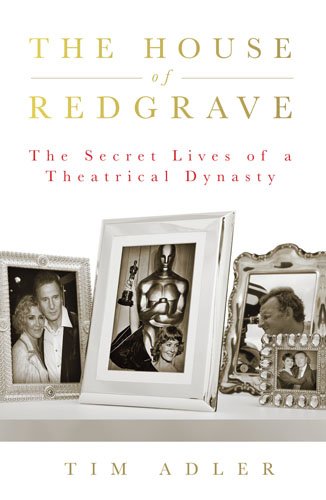
Written by Kristen Lopez
The Redgrave family never liked to be referred to as “a dynasty,” as it invoked images of power, and yet author Tim Adler proves in his biography The House of Redgrave that they were. The three generations of Redgrave’s, and by extension the Richardson’s, are an acting powerhouse who have awards in every ceremony both here and abroad. The book is interesting, but at times can leave more questions than answers, specifically about the progenitor of the Redgrave dynasty, patriarch and actor Michael. The title is highly misleading, spending far too much time on director Tony Richardson, and at times the spelling, punctuation, and historical inaccuracies can be maddening, but the bio is well-researched and not particularly lurid considering the digressions it takes. The House of Redgrave: The Lives of a Theatrical Dynasty is worth purchasing for fans of the family.
I’ve seen the various works of the Redgrave clan, but wouldn’t call myself a fan. The House of Redgrave doesn’t change my opinions, considering it doesn’t spend nearly enough time focusing on the family of the title, but it has inspired me to actually look at the work of the family. The three Redgrave children: Vanessa, Corin, and Lynn have an astounding body of work and Adler explores their career choices, both professional and political. Vanessa has been an outspoken political activist and Adler devotes several chapters to exploring how her radical political attitudes were both a help and, more often than not, a hindrance to her career. The most intriguing chapters look at her political affiliation with a radical England group that comes off like a cult. I wasn’t left with an overall view of what Adler feels about Vanessa, at times he seems to both condemn and praise her, but the story itself is so fascinating that the author’s viewpoints don’t obscure.
At over 300 pages, I never felt outright bored with The House of Redgrave. I felt frustrated and left with several questions, but if anything I was inspired to read other works (not sure if that’s a praise for Adler’s work, or not). The predominant flaw is that title; this is not a biography about the Redgrave’s in the literal sense. Yes, they are present and the book explores their lives, but they’re pushed to the margins in favor of presenting a detailed biography of Tony Richardson. In fact, I’ve found this book listed under the name The Redgrave’s and The Richardson’s. Had the book been listed under the latter title, I could have changed my expectations accordingly. Without knowing that, I kept wondering why we needed to know every move, and movie, in Richardson’s career. Yes, he is the father of Natasha and Joely Richardson, as well as Vanessa’s husband, but Adler really loves Richardson as a director and playwright. Don’t get me wrong; the Richardson sections are fascinating. Richardson’s work in creating the Free Cinema revolutionized British stage and film; I just didn’t expect to have the book focus on him. Particularly once you realize that Michael Redgrave gets one opening chapter, and that’s it. There’s zero discussion of his life and career, and yet there’s at least eight of the twenty-three chapters devoted to Richardson. It doesn’t provide as fleshed out of a narrative to the Redgrave dynasty as a book about them proper, but it does show how Richardson’s actions affected his wife and family.
Another major issue is the fact this could have used a proof read. I hate to critique grammar, but since this is the completed work, there’s no excuse. The main flaw is that quotations don’t use quotation marks but commas, or they simply have on set and never close the quotation. When the person being quoted actually uses something that is a quote, only then does Adler use quotation marks. Lengthy sentences of someone’s dialogue literally blends into Adler’s own statements. There are also several historical inaccuracies such as British model Gail Benson being a relative to Jackie Kennedy Onassis (she wasn’t) or calling American producer Walter Wagner (real name Walter Wanger). These are things that would commonly be blips on a casual reader’s radar, but with the allegations he does include about murder, and homosexuality of a lot of people these slights are ridiculous.
The latter sections focused on the Richardson daughters are fascinating, but they can read like an IMDB page of titles. The focus on Natasha Richardson’s death is still sad years later, but nothing that hasn’t been rehashed in other newscasts.
Overall, The House of Redgrave is misleading, but worth a read. The tone is brisk and never gets bogged down in family trees and acting critiques. This can make the people being discussed appear undeveloped. The Redgrave’s are not developed enough in favor of creating a biography for Tony Richardson, and the spelling/name mistakes can lessen the impact of Adler’s arguments. I’d recommend reading it if you’re a Redgrave completist bent on reading everything ever written.